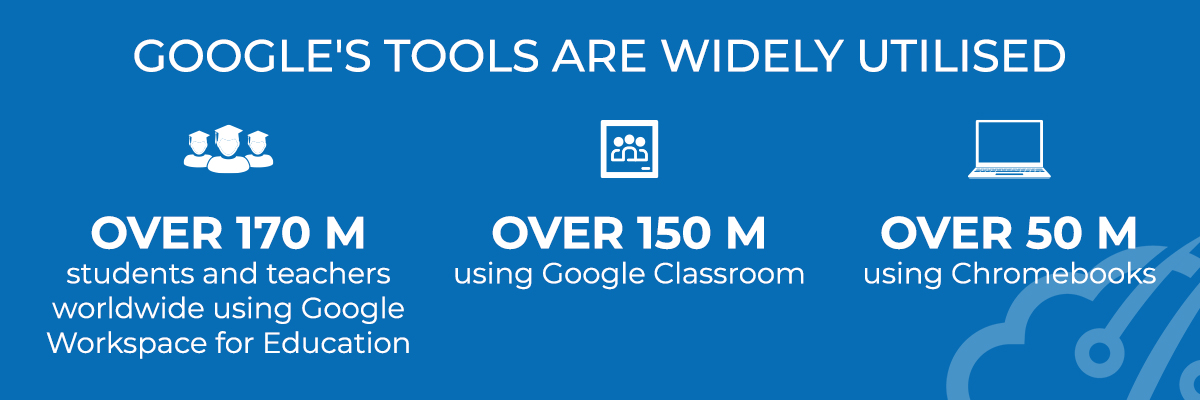Africa is embracing GWS For Education + Chromebooks
Africa is often perceived as a continent plagued by poverty, conflict and underdevelopment. However, this narrative is rapidly changing as Africa proves to be an incredibly diverse continent with rich cultures, vibrant economies and a growing commitment to education transformation.
Schools and universities across the continent are now stepping into the digital age, with many adopting Google Workspace for Education, supported by Chromebooks, as their technology of choice.
Digcloud Africa, Google’s reseller enablement partner in Africa, reports a swift adoption of digitally enabled education in both public and private schools.
While the integration of technology was on the horizon for educational institutions, the COVID-19 pandemic acted as a catalyst, accelerating their plans. With Google Workspace for Education, these institutions are achieving one-on-one learning, implementing improved learning management solutions, and utilising devices in classrooms for accessing resources, collaborating, uploading assignments, and facilitating peer reviews, both in-class and remotely.
Addressing Connectivity Concerns
Initially, connectivity posed a challenge, but the good news is that both private and public sector organisations are now offering free or low-cost connectivity to schools. This crucial support enables schools to embrace new teaching and learning methods.
Easy Collaboration Anytime, Anywhere
Candice Erasmus, Training and Change Management Consultant at Digicloud Africa, and end-user specialist for Google Workspace, emphasises that Google for Education meets the needs of schools, parents and learners. With over 170 million students and teachers worldwide using Google Workspace for Education, over 150 million using Google Classroom, and over 50 million using Chromebooks, Google’s tools are widely recognised and utilised.

“Because Google tools are familiar to everyone, the Education suite is easy to navigate and use.” Erasmus highlights the ease of navigation and use of Google tools, making the Education suite accessible across any device without the need for app downloads. This universality, combined with the platform’s mobile-friendly nature, contributes to its popularity in Africa. Digicloud Africa, as Google’s chosen enablement partner, supports Google for Education solutions in Africa.
According to Erasmus, Google for Education offers tiered and customisable editions, starting with Google Workspace for Education Fundamentals, providing free and secure communication and collaboration tools. Schools can choose to upgrade to Education Standard, Teaching and Learning Upgrade, or the premier Education Plus Edition, which offers advanced security, analytics, and enhanced teaching and learning tools. (Read: Enhancing Education with Google Workspace for Education Plus)
The enterprise-grade version supports meetings with up to 500 participants and streaming to up to 100,000 in-domain viewers with Google Meet. It also includes personalised cloud search within the customer’s domain. Additionally, schools and universities with Google Workspace for Education subscriptions have a baseline of 100 TB of pooled storage shared across all users.
Regardless of the edition, Google Workspace for Education provides essential tools such as Gmail, Google Calendar, Meet, Docs, Sheets, Slides, Forms, Classroom, Sites, Assignments, Groups, Drive, Admin, Tasks, and Jamboard. Google Classroom, in particular, enables teachers to assess progress from anywhere and includes features like originality reporting to detect plagiarism and copying among learners. (Read: Comparing Plagiarism Tools)
Google’s Integrated Ecosystem
Schools can take advantage of Google’s integrated ecosystem for security and management. The ability to customise features for young learners, along with the standardisation of Google Chromebooks, further simplifies management.
By standardising devices, teachers are able to easily assist students, and schools can seamlessly roll out patches and updates.
Chromebook devices, known for their affordability, complete the Google learning environment. They are easy to administer, secure, and come in various shapes and sizes, including tablets, convertibles and laptops.
Chromebooks use the principle of “defence in depth” to provide multiple layers of protection, so if any one layer is bypassed, others are still in effect.
Chromebooks have the following security features built-in:
- Automatic updates
- Sandboxing
- Verified Boot
- Data Encryption
- Recovery Mode
Take Home Message
In conclusion, Google Workspace for Education is not just transforming classrooms but rewriting the narrative of education in Africa. The adoption of this technology is not just a response to challenges but a proactive step towards creating a more connected, dynamic, and inclusive learning environment across the continent.
Radical Cloud Solutions is a proud Google Premier Partner. Drop us an email and our team will be delighted to provide you with comprehensive insights into the innovative solutions that Google for Education brings to the table.




